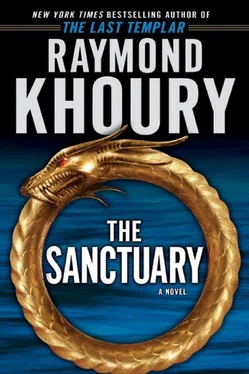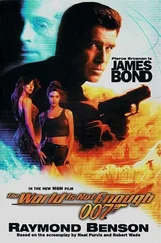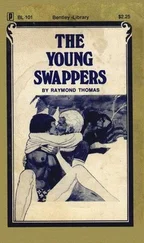The false marquis struggled to parry the resurgent di Sangro’s thrusts as the flames from the carpet grew furiously and licked at the thick velvet curtain before taking hold of it. The heat and the smoke in the bedchamber were infernal as the prince fought on relentlessly and surprised Montferrat with a ferocious strike that knocked the sword from his hands. Montferrat stepped backwards, trying to avoid the edge of di Sangro’s blade, which now loomed too close to his throat. Through the rising smoke in the chamber, he noticed that the thug with the burnt hand had managed to extinguish the flames on his coat and was now rising to rejoin the fray. The man moved sideways, positioning himself by the bedchamber door to block any attempt at escape by Montferrat.
Montferrat was outnumbered and outgunned, and he knew it.
Darting nervous glances left and right, he saw a possible way out and decided to chance it. He raised his hands and sidestepped towards the burning curtain, his eyes locked on di Sangro.
“We need to put this fire out before it spreads to the other floors,” Montferrat shouted, his feet circling cautiously towards the curtain.
“To hell with the other floors,” di Sangro fired back, “just as long as what you know doesn’t go up in flames.”
Montferrat had managed to edge his way over to the burning curtain. The henchman’s discarded, half-burnt coat was lying there, smoldering. Montferrat made his move. He grabbed the coat and used it to shield his hands as he reached into the flames and yanked the curtain off its rail before flinging it at di Sangro and his lackey. The flaming cloak landed heavily on the prince’s man, who yelled out in horror as he furiously tried to bat it off him. It enshrouded him in its flaming embrace until he managed to flick it to the floor, where it created a barrier of fire between them and their quarry. Montferrat didn’t wait. He yanked open the door to the balcony and rushed out into the night.
After the intense heat in the bedchamber, the chilly air coming in from the bay hit him like a slap. Casting a quick look back inside, he saw di Sangro and his half-burnt henchman trampling feverishly on the flames and edging around them to follow him. Di Sangro raised his gaze and locked eyes with Montferrat. Montferrat nodded, and with his heart in his mouth, he climbed onto the railing and flung himself off it.
He landed with a thud on the balcony of an adjacent chamber on the floor below. The landing sent a jolt of pain searing through his jaw and teeth and rattling in his head. He shook it off and sprang to his feet, climbing over the wrought-iron railing before hurling himself onto the roof that jutted out two floors below just as di Sangro made it onto the balcony.
“Get him,” di Sangro yelled into the darkness as he stood there, backlit by the flames like a demon from hell. Montferrat glanced over at the palazzo’s entrance and spotted two men rushing out into the darkness, silhouetted against the light coming from a lantern one of them carried. He clambered across one roof and jumped onto the roof of an abutting structure, sending tiles clattering to the ground below. He looked at the rooftops and chimneys ahead, mapping out his escape route. In the darkness of the densely built city, he knew he could lose his pursuers and disappear.
What concerned him more was what he knew had to come.
Once he had retrieved the precious trove he kept tucked away in a safe spot, far from his palazzo — a precaution he always took — he would have to move on.
He would have to find himself a new name and a new home.
Reinvent himself. Yet again.
He had done it before.
He would do it again.
He heard di Sangro bellowing “Montferrat” into the night like a man possessed. He knew he hadn’t seen the last of him. A man like di Sangro wouldn’t give up that easily. He’d been infected by a feverish greed that, once it took hold of a man, would never let go.
The thought chilled Montferrat to the bone as he slipped into the night.
Baghdad — April 2003
“Sir, we’ve just gone over the ten-minute mark.”
Captain Eric Rucker of the First Battalion, Seventh Cavalry Regiment, checked his watch and nodded. He looked at the faces around him, grimy and tense, dripping with sweat. It wasn’t even ten in the morning and the sun was already beating down on them with murderous heat. The heavy protective gear didn’t help either, not when it was 110 degrees in the shade. But they couldn’t do without it.
The deadline had passed.
It was time to go in.
With eerie synchronicity, a call to prayer from a nearby minaret cut through the dusty, stifling air. Rucker heard a creak behind him and looked up to see an old woman with half-graying, half-hennaed hair lean out from a window in a house across the street from the target. She studied him with grim, lifeless eyes before swinging the window’s shutters closed.
He gave her a few moments to find shelter deeper in the house, then, with a curt nod to the XO, he initiated the assault.
A Mark 19 grenade launched from the lead Humvee whistled across the wide street and obliterated the main gate to the compound. Squad leaders rushed in with twenty or so soldiers close behind and immediately came under small-arms fire. Bullets snapped around them as they fanned out through the courtyard and ducked for cover behind anything they could find. Two men fell before the rest had managed to secure safe positions on either side of the house’s entrance. They soon unleashed a torrent of gunfire onto the house as cover while the wounded were swiftly pulled back out to the relative safety of the street by men with big biceps and bigger hearts.
The house’s front door was barricaded, its windows blocked out. Over the next twenty-two minutes, thousands of rounds were exchanged, but little progress was made. Another soldier was hit as the car he was crouching behind was peppered with bullets from the house.
Rucker gave the order to withdraw. The house was surrounded. The men inside weren’t going anywhere.
Time was on his side.
* * *
Like so many of the others that followed, it had all started with a walk-in.
On that sweltering spring evening, a middle-aged man in a tattered suit and a swath of soiled cloth around his head had walked up to the soldiers manning the gate at FOB Camp Headhunter. Wary of being spotted cozying up to the enemy, he spoke low and fast. The soldiers kept him at bay while they called over a local they used as an interpreter. The interpreter listened to the man’s claims and told them the man should be allowed in as soon as he could be checked for explosives. The interpreter then rushed in to alert the camp’s commander.
The man had information regarding the whereabouts of a “person of interest.”
The hunt was on.
Tracking down Saddam’s gang of hard-core Ba’athists was priority one for the military in Iraq. The “thunder run” had been swift, the city had been taken sooner and with far more ease than expected, but most of the bad guys had skipped town. Few on the Pentagon’s deck of fifty-five most-wanted Iraqis — not the Ace of Spades himself, nor his two sons — had been captured or killed as yet.
Safely ensconced in a briefing room in the base, the man in the headdress was agitated when he spoke. More than agitated. He was downright terrified. The interpreter pointed this out to the base commander, who didn’t read too much into it. For him, it was expected. These people had lived under a monstrous and ruthless dictatorship for decades. Squealing on one of their tormentors wasn’t exactly a casual undertaking.
The interpreter wasn’t so sure.
The base commander was disappointed to find out that the regime member being shopped by the man in the headdress wasn’t on the Pentagon’s most-wanted list. In fact, no one had ever heard of him. They didn’t seem to know anything about him at all.
Читать дальше












